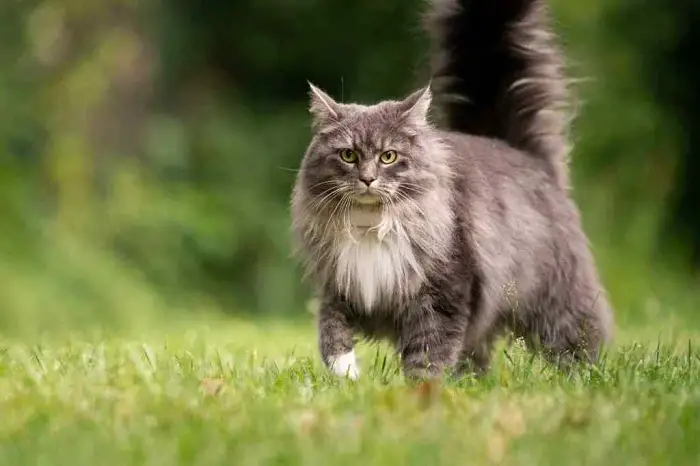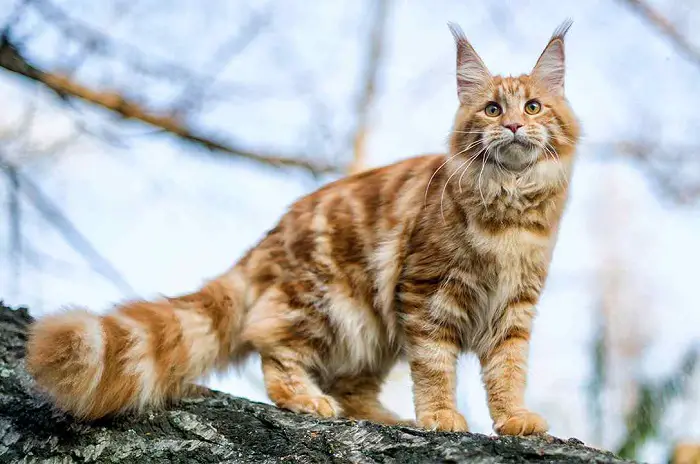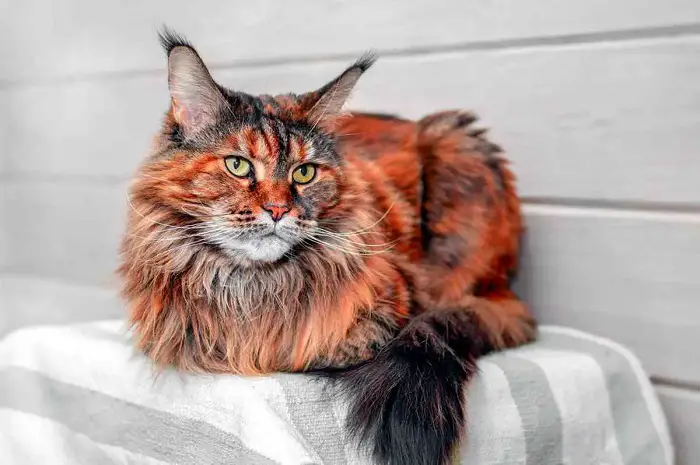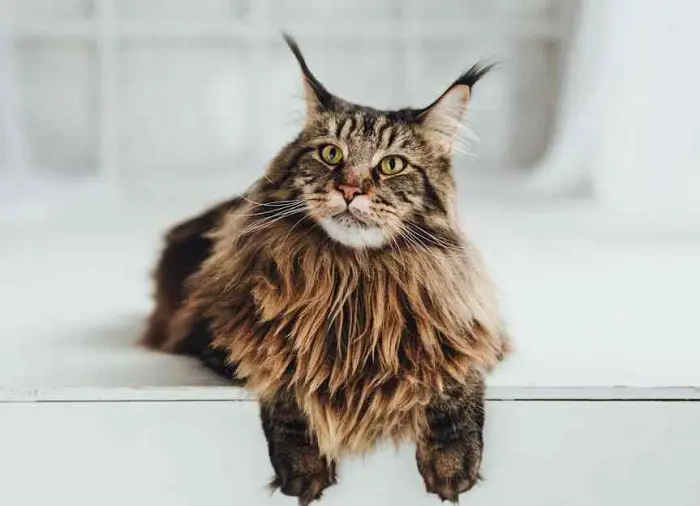The Maine Coon cat is a popular and fascinating breed known for its large size, striking appearance, and friendly nature. Often referred to as the “gentle giant” of the cat world, Maine Coons are cherished by many cat enthusiasts around the globe. Let’s delve into some key aspects of this remarkable feline breed.
Maine Coon cats are an impressive breed known for their large size, striking appearance, and friendly temperament. Whether it’s their majestic presence, playful antics, or affectionate nature, these gentle giants have captured the hearts of cat lovers worldwide.
Origin and History of Maine Coon Cat
The exact origin and history of the Maine Coon cat breed are still somewhat unclear and mysterious. Several theories and legends have emerged to explain their beginnings, but no definitive evidence has been found. However, a few popular theories are often discussed among enthusiasts.
One theory suggests that the Maine Coon results from natural evolution in response to the harsh climate of Maine, a northeastern state in the United States. According to this theory, longhaired cats that accompanied European settlers mated with local short-haired cats, resulting in a breed that adapted to the region’s cold, snowy winters and rugged landscape. Over time, these cats developed distinctive characteristics, such as their large size, tufted ears, and water-resistant fur.
The raccoon hybrid theory is another, often regarded as more of a legend. According to this tale, longhaired domestic cats mated with raccoons, leading to the creation of the Maine Coon breed. However, from a biological standpoint, this is impossible, as cats and raccoons belong to different species and cannot produce offspring together.
The Maine Coon’s history can be traced back to the 19th century when they were commonly found in the state of Maine and surrounding areas. They were highly valued as skilled hunters and barn cats, helping to control rodent populations on farms and ships. Due to their robust physique, large size, and hunting abilities, they gained popularity among locals.
The breed’s early history lacks written records, and the true origin of the Maine Coon remained uncertain until the late 19th century. The first recorded mention of the Maine Coon in a cat show was in 1861 in Maine. During that time, Maine Coons were exhibited at local and regional fairs, where they gained recognition for their unique qualities.
In the late 19th century, the Maine Coon breed faced significant challenges. Introducing imported longhaired cat breeds, such as the Persian, into the United States led to a decline in interest and popularity for Maine Coons. Many breeders focused on these new imported breeds, and the Maine Coon was often overlooked.
However, dedicated Maine Coon enthusiasts worked tirelessly to preserve the breed. In 1895, the first known Maine Coon breed club, the Maine Coon Breeders and Fanciers Association, was formed. It aimed to promote and protect the breed’s unique characteristics. Despite their efforts, the Maine Coon breed struggled to regain widespread recognition until the mid-20th century.
In the 1960s, the Maine Coon experienced a resurgence in popularity, and it gained recognition from cat fancier associations. The breed was officially certified by the Cat Fanciers’ Association (CFA) in 1976, and today it is one of the most beloved and well-known cat breeds in the United States and internationally.
While the exact origins of the Maine Coon remain uncertain, it is widely accepted that this breed evolved naturally in Maine and surrounding areas. Over time, through natural selection and selective breeding efforts, the Maine Coon developed its unique characteristics, making it a special and distinctive breed in the feline world.
Physical Features of Maine Coon Cats
The Maine Coon cat is known for its distinctive and impressive physical features. Here are some key characteristics of the breed:
- Size: Maine Coons are one of the largest domesticated cat breeds. They have a substantial and muscular build. Males typically weigh between 13 to 18 pounds (5.9 to 8.2 kilograms), while females range from 8 to 12 pounds (3.6 to 5.4 kilograms). It’s not uncommon for some Maine Coons to exceed these average weights, with some males weighing over 20 pounds (9 kilograms).
- Body Structure: Maine Coons have a rectangular body shape with a broad chest and a long, sturdy frame. Their bodies are well-balanced and muscular, giving them a robust appearance. Despite their size, Maine Coons move gracefully and with agility.
- Coat: One of the most distinguishing features of the Maine Coon is its long, shaggy, and water-resistant coat. It comprises a dense top layer of guard hairs and a soft, insulating undercoat. The fur is generally silky and can vary in length, with the longest fur typically found on the ruff around the neck, the tail, and the belly. The coat comes in various colors and patterns, including tabby, tortoiseshell, solid, and many more.
- Head: Maine Coons have a large and slightly rectangular head shape. The head is proportionate to the body and features high cheekbones. They have a square muzzle and a prominent chin. The breed’s ears are one of its most striking features. They are extensive, broad at the base, and often have tufts of fur at the tips. Lynx-like tufted ears are highly desirable in the breed standard.
- Eyes: Maine Coons have large, expressive eyes that are usually well-spaced. The eye colors vary, including green, gold, and copper shades. White Maine Coons or those with white patterns may have blue or odd-colored eyes.
- Tail: The Maine Coon’s tail is long, full, and bushy. It tapers towards the tip and is covered with dense fur. The tail is essential to their balance and agility and often serves as a cozy wrap during rest.
- Paws: Maine Coons have large and tufted paws, contributing to their ability to navigate through snowy terrain. Their paws have solid and muscular structures, and they often use them for batting at toys or grasping objects.
These physical features contribute to the Maine Coon’s distinctive and majestic appearance. They are well-adapted to withstand harsh weather conditions and showcase their strength, grace, and beauty.
Height, Weight, and Lifespan of Maine Coon Cat
The Maine Coon cat breed is known for its large size and robust build. Here are the average height, weight, and lifespan of Maine Coon cats:
Height: Maine Coons are considered a tall breed. On average, they stand around 10 to 16 inches (25 to 40 centimeters) at the shoulder. However, it’s important to note that the height can vary depending on the individual cat.
Weight: Maine Coons are one of the heaviest domestic cat breeds. The average weight of a male Maine Coon ranges between 13 to 18 lb (5.9 to 8.2 kg). Females tend to be slightly smaller and weigh between 8 to 12 lbs (3.6 to 5.4 kgs). However, there are some Maine Coons that can exceed these average weights, with some males weighing over 20 pounds (9 kilograms) or more.
Lifespan: Maine Coons have a relatively long lifespan compared to other cat breeds. On average, they live between 12 to 15 years. However, with proper care, nutrition, and a healthy lifestyle, some Maine Coons can live into their late teens or early twenties.
Colors of Mine Coon Cats
Maine Coon cats come in a wide range of colors and patterns. The Cat Fanciers’ Association (CFA), one of the major cat registries, recognizes several colors and patterns for the Maine Coon breed. Here are some of the standard color variations seen in Maine Coons:
- Brown Tabby: This is the most common and recognized color pattern for Maine Coons. It consists of a brown or dark-colored coat with darker stripes or markings. The tabby pattern can vary in intensity and may include various shades of brown.
- Silver Tabby: This color pattern features a silver or grayish base coat with dark gray or black stripes. The contrast between the silver and darker markings creates an eye-catching appearance.
- Red Tabby: Red tabby Maine Coons have a warm reddish or orange base coat with darker red or brown tabby markings. They can range from lighter shades to deep, vibrant reds.
- Tortoiseshell: Tortoiseshell Maine Coons have a patchy coat that combines two or more colors, such as black and red. The patches can be distributed randomly or in a specific pattern, creating a unique and beautiful mosaic effect.
- Blue: Blue Maine Coons have a bluish-gray coat ranging from pale to a deeper shade of blue. The coat appears solid without tabby or tortoiseshell markings.
- White: Maine Coons can also have solid white coats. Their fur is entirely white without any other colors or patterns.
- Cream: Cream-colored Maine Coons have a pale, off-white, or cream-colored coat. The coat appears solid without any tabby or tortoiseshell markings.
In addition to these colors, Maine Coons can have variations with different patterns, such as smoke, shaded, and bi-color. Smoke Maine Coons have a solid base color with a white undercoat that creates a smoky or frosted appearance. Shaded Maine Coons have a gradient of color, with a darker color at the tips of the fur and a lighter base. Bi-color Maine Coons have large patches of white along with another color, creating a striking contrast.
The Behavior of Maine Coon Cat
Maine Coon cats are known for their distinctive and charming behavior. Here are some critical behavioral traits commonly associated with the Maine Coon breed:
Gentle and Friendly: Maine Coons have earned the nickname “gentle giants” for their friendly and pleasant nature. They are typically affectionate and enjoy being around their human companions. They often form strong bonds with their owners and are known to be quite loyal.
Playful and Energetic: Maine Coons have a playful and energetic personalities. They enjoy interactive play sessions and can be pretty active. They often retain their playful demeanor well into adulthood, making them great companions for families with children or other pets.
Intelligent and Curious: Maine Coons are considered to be brilliant cats. They are known for their problem-solving abilities and can often figure out how to open doors or retrieve toys from difficult places. They have a curious nature and enjoy exploring their surroundings, which can sometimes lead to them getting into mischief.
Dog-like Behavior: Maine Coons are often described as having dog-like traits. They may follow their owners around the house, greet them at the door, and even play fetch. Some Maine Coons can be trained to walk on a leash and perform tricks, emphasizing their dog-like behavior.
Sociable with Other Pets: Maine Coons generally get along well with other pets, including dogs and cats. They are friendly and tolerant and can adapt well to multi-pet households. However, as with any breed, individual personalities can vary, so proper introductions and gradual socialization are essential.
Communication: Maine Coons are known for being vocal cats. They often communicate sounds with their owners, including chirps, trills, and soft meows. They may “talk” to their owners to get attention or express their needs.
Water Fascination: Unlike many other cat breeds, Maine Coons often have a fondness for water. Some may enjoy playing with water, dipping their paws in the water bowl, or even joining their owners in the shower or bath. This behavior is not universal to all Maine Coons, but it is a notable breed characteristic.
Food and Nutrition of Maine Coon Cat
Proper nutrition is crucial for the health and well-being of Maine Coon cats. As a large and active breed, they have specific dietary needs. Here are some considerations for the food and nutrition of Maine Coon cats:
- High-Quality Cat Food: Feed your Maine Coon a high-quality commercial cat food formulated for their life stage (kitten, adult, or senior). Look for a cat food brand that provides balanced nutrition and meets the nutritional guidelines set by veterinary associations, such as the Association of American Feed Control Officials (AAFCO).
- Protein-Rich Diet: Maine Coons requires a diet rich in high-quality animal protein. Look for cat food that lists a meat source, such as chicken, turkey, or fish, as the primary ingredient. Protein helps support muscle development and overall health.
- Controlled Calorie Intake: Maine Coons tend to gain weight, so it’s essential to monitor their calorie intake and ensure they maintain a healthy weight. Obesity can lead to various health issues. If your Maine Coon is overweight, consult a veterinarian to determine an appropriate feeding plan and portion sizes.
- Balanced Nutrients: Maine Coons need a balanced diet with essential vitamins, minerals, and fatty acids. Omega-3 fatty acids in fish oil or specific cat food formulations benefit their skin, coat, and overall health.
- Adequate Hydration: Maine Coons may have a greater need for water due to their larger size and higher activity levels. Ensure fresh water is always available for them. Some Maine Coons enjoy drinking from running water sources, so a water fountain can be beneficial in encouraging hydration.
- Feeding Schedule: Establish a regular feeding program for your Maine Coon to help maintain a healthy routine. Dividing their daily portion into multiple meals can help prevent overeating and aid digestion.
- Monitor Dietary Needs: As Maine Coons age, their nutritional requirements may change. Senior Maine Coons may benefit from a diet formulated for senior cats, which considers their specific needs, such as joint support and controlled calorie content.
Health and Diseases of Maine Coon Cat
Maine Coon cats are generally considered a healthy breed with a robust constitution. However, like all cats, they can be prone to specific health conditions. It’s essential to be aware of these potential health issues and take adequate measures to prevent, detect, and treat them. Here are some common health concerns seen in Maine Coon cats:
- Hypertrophic Cardiomyopathy (HCM): HCM is a common heart disease in cats, including Maine Coons. It is characterized by the thickening of the heart muscle, which can lead to heart failure. Regular cardiac screenings and echocardiograms are recommended for Maine Coons to detect HCM early.
- Hip Dysplasia in Cats: Hip dysplasia is a condition where the hip joints don’t develop properly, leading to discomfort and mobility issues. Maine Coons can be prone to hip dysplasia due to their large size. Responsible breeding practices and regular veterinary check-ups can help identify and manage this condition.
- Polycystic Kidney Disease (PKD): PKD is an inherited condition where cysts develop in the kidneys, eventually affecting their function. Regular screening through ultrasound can help detect PKD in Maine Coons, and responsible breeding practices can help reduce the incidence of this disease.
- Spinal Muscular Atrophy (SMA): SMA is a genetic disorder that affects the muscles, causing weakness and poor coordination. It is inherited in an autosomal recessive manner. Responsible breeders can test for the gene mutation that causes SMA and avoid breeding affected cats.
- Feline Lower Urinary Tract Disease (FLUTD): FLUTD encompasses various conditions that affect the urinary system, including urinary tract infections, bladder stones, and urinary blockages. Maine Coons can be predisposed to FLUTD due to their genetics and potentially their large size. A balanced diet, promoting hydration, and regular veterinary check-ups can help prevent and manage FLUTD.
- Obesity: Maine Coons tend to gain weight if their diet and exercise are not adequately managed. Obesity can lead to various health issues, including diabetes, joint problems, and reduced quality of life. Monitoring their weight and providing a balanced diet and regular exercise are essential to maintain a healthy body.
The popularity of Maine Coon
The Maine Coon cat breed is known for its popularity among cat lovers worldwide. It has gained significant recognition and has consistently been among the most popular cat breeds. Here are some factors that contribute to the popularity of the Maine Coon:
- Size and Appearance: The Maine Coon’s large size, distinctive physical features, and majestic appearance often appeal to cat enthusiasts. Their long, shaggy coat, tufted ears, and impressive stature make them stand out among other cat breeds.
- Gentle and Friendly Nature: Maine Coons are known for their gentle and friendly personalities. They are typically friendly and affectionate and enjoy human companionship. Their friendly demeanor and compatibility with families, including children and other pets, contribute to their popularity as companion animals.
- Playful and Intelligent: Maine Coons have a dynamic and playful nature. They are brilliant cats that enjoy interactive play and mental stimulation. Their playful and engaging behavior makes them enjoyable pets for families and individuals seeking an interactive and entertaining feline companion.
- Dog-Like Traits: Maine Coons are often described as having dog-like characteristics. They can be loyal and friendly and may exhibit behaviors like following their owners around the house, greeting them at the door, and even playing fetch. This unique combination of feline and canine traits appeals to many people looking for a companion with specific personality traits.
- Affectionate Bond: Maine Coons are known for forming strong bonds with their owners. Their loyalty and affectionate nature contribute to their popularity as pets. Many Maine Coon owners appreciate the deep connection and companionship they experience with their cats.
- Versatility and Adaptability: Maine Coons generally adapt to different living environments, including apartments and houses. They can adapt well to indoor living but also enjoy some outdoor access if provided safely and supervised. This versatility makes them suitable for a range of lifestyles and living situations.
- Online Presence and Media Exposure: The internet and social media platforms have played a significant role in the popularity of the Maine Coon breed. Many Maine Coon owners and enthusiasts share photos, videos, and stories of their cats online, contributing to their visibility and popularity in the virtual world.
Concluding Remarks on Maine Coon Cat
The Maine Coon cat is a remarkable and beloved breed that captures the hearts of many cat enthusiasts. With their large size, stunning appearance, and friendly nature, Maine Coons have become one of the most popular and sought-after cats breeds globally.
Originating from the state of Maine in the United States, Maine Coons have a rich history and are often associated with tales and legends. They are known for their distinctive physical features, including their tufted ears, bushy tails, and water-resistant coats in various colors and patterns.
Beyond their striking appearance, Maine Coons are cherished for their gentle and friendly personalities. They form strong bonds with their owners, are friendly with other pets, and often display dog-like traits such as following their owners around and playing fetch. Their playful and intelligent nature makes them appealing as interactive and engaging companions.



